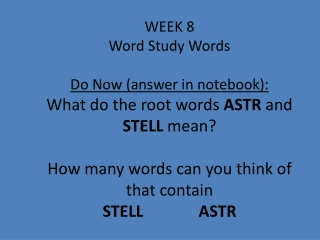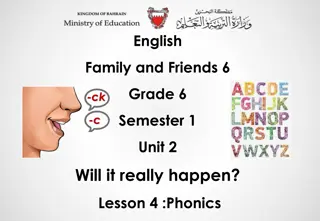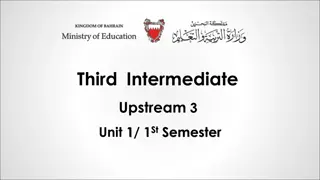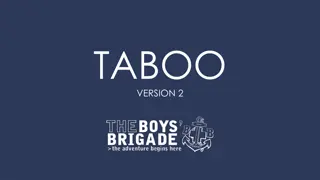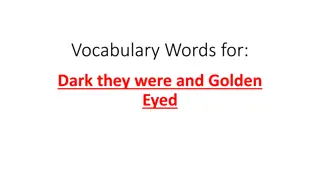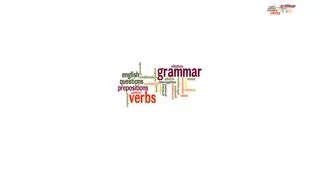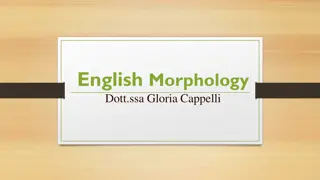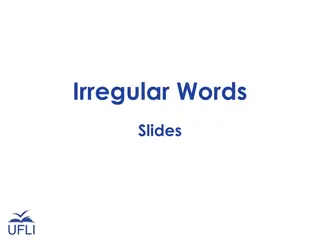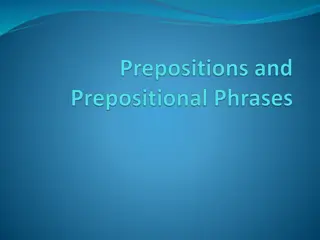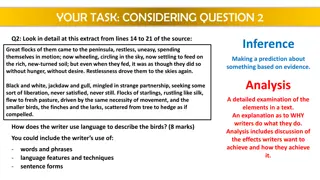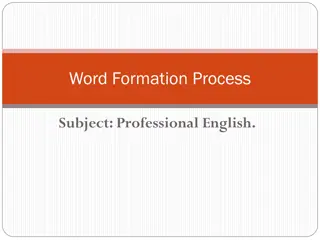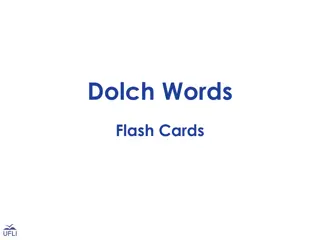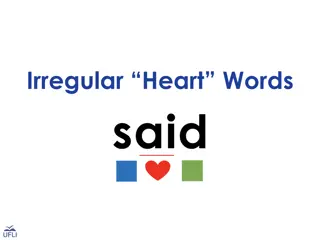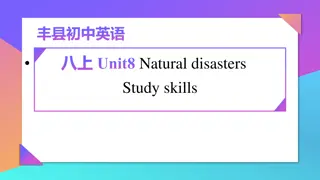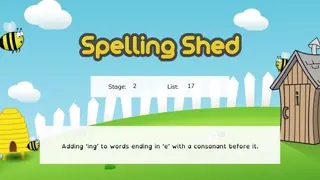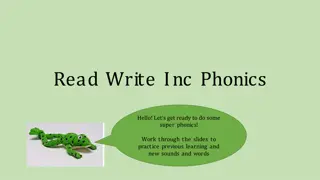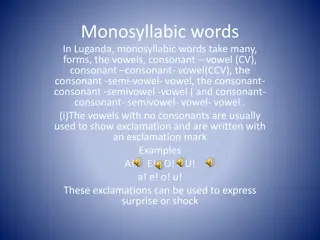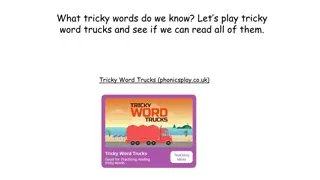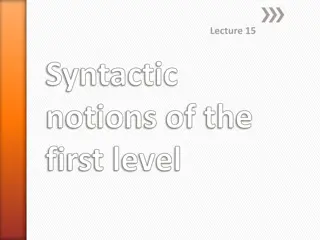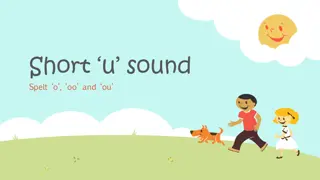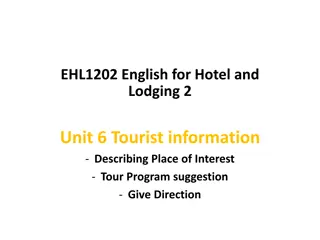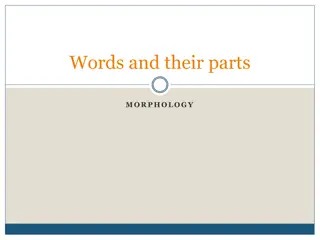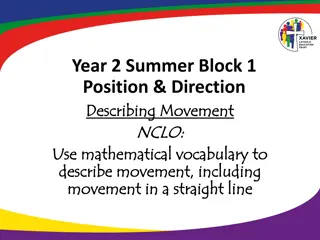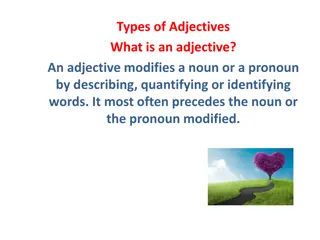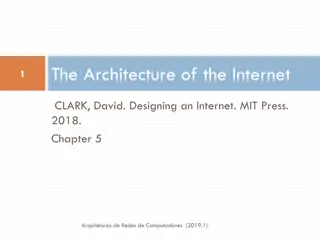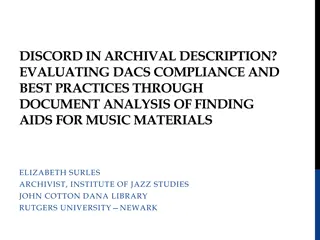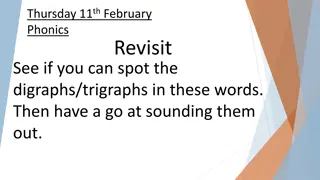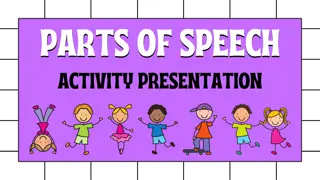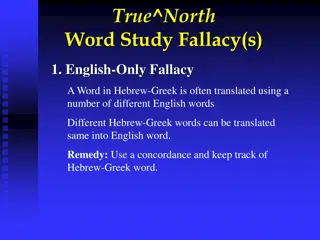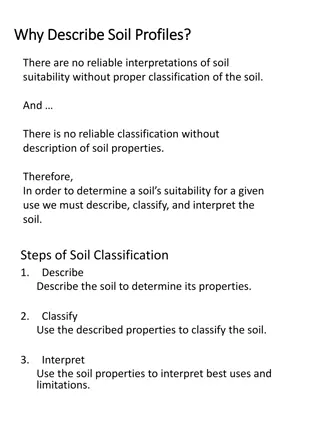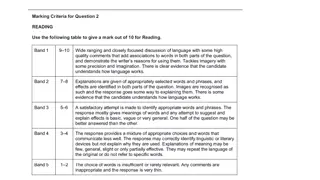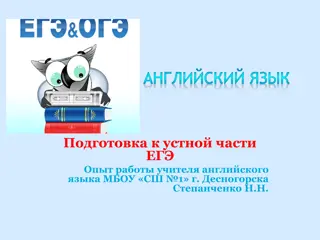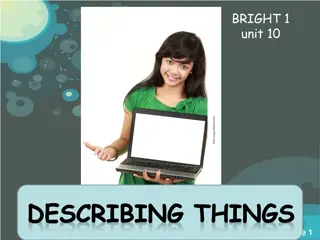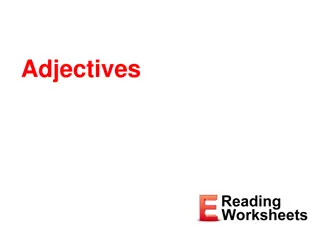Explore Root Words ASTR and STELL
Uncover the meanings of the root words ASTR and STELL through words like astronomy, asteroid, stellar, and more. Delve into the world of stars and star-like objects through words that are rooted in ASTR and STELL.
34 views • 14 slides
Phonics Lesson for Grade 6: Words ending with "-ck" and "-c
This lesson focuses on identifying and spelling words ending with "-ck" and "-c," as well as using them accurately in sentences. Students will practice words like duck, picnic, music, neck, plastic, comic, rock, and clock. Activities include completing words with "c" or "ck," practicing spelling, an
1 views • 9 slides
Actors Wanted: Describing Characters for Films
This lesson focuses on identifying character adjectives, vocabulary related to appearance, and writing paragraphs describing a favorite person. It includes two tasks involving analyzing texts for casting calls and finding character and appearance adjectives. Students will engage in activities to enh
0 views • 21 slides
Fun Game Night Ideas - Engage Your Friends with Taboo and More
Elevate your game nights with Taboo Version 2 and other exciting activities like guessing games and word association challenges. Split into teams, take turns describing words, and try to score points by getting your team to guess as many words as possible within the time limit. Enjoy delicious food,
0 views • 58 slides
Vocabulary Words: Dark They Were and Golden-Eyed
Explore the meanings of words such as "amiss," "bewildered," "dwindle," "forlorn," "perspire," "villa," "recede," and "flimsy" with sentences from a text describing a dark and golden scene reflecting sadness, confusion, and more. Expand your vocabulary and understanding of these terms.
0 views • 13 slides
Understanding Verbs: Action vs. State, Dynamic vs. Stative
Verbs are essential in sentences, describing actions or states of subjects. They can convey a sense of action like running or state like being. The distinction between dynamic (action) and stative (non-action) verbs is crucial, with dynamic verbs being used in continuous tenses and stative verbs des
0 views • 31 slides
Understanding English Morphology: The Study of Words and Meaning
English Morphology delves into the structure of words, exploring morphemes as the building blocks of linguistic meaning. From free morphemes like "certain" to bound morphemes like "-ly," the discipline uncovers how words are constructed and adapted grammatically. By examining the derivational and in
0 views • 49 slides
Irregular Words: Learn and Review Commonly Used Words
This text provides a list of irregular words commonly used in English. It includes words like "the," "has," "were," and "know." Practice and remember these words to improve your vocabulary and language skills.
0 views • 169 slides
Understanding Prepositions and Prepositional Phrases
Prepositions are words that connect nouns or pronouns to other words in a sentence, indicating time or direction. Prepositional phrases include a preposition, its object (a noun or pronoun), and modifiers for that object. They act as adverbs, describing when, where, or how things happen. Examples an
0 views • 7 slides
Analyzing Language in Describing Birds
Delve into the writer's use of language in vividly describing the behaviors of different bird species in the given extract. Explore how words, phrases, and language techniques are employed to depict the restlessness, movement, and interactions among the birds, creating a dynamic and engaging portray
0 views • 22 slides
Various Word Formation Processes in Professional English
Coinage, Borrowing, Compounding, Derivation, Blending, Backformation, and Acronym are key mechanisms for forming new words in Professional English. Coinage involves inventing new words, Borrowing uses words from foreign languages, Compounding combines words to create new ones, Derivation adds prefix
0 views • 11 slides
Dolch Words Flash Cards: Pre-Primer Level Vocabulary
Explore a collection of Dolch words flashcards, including common words like "the," "to," "and," "a," and more. These vibrant images provide an engaging way to learn and practice essential pre-primer level vocabulary words. Enhance your reading and language skills with this visual learning resource.
0 views • 226 slides
Understanding Irregular Heart Words in Teaching
Exploring the concept of irregular heart words in teaching where common words present challenges due to irregularities in letter-sound correspondences. Learn how to help students decode and master these irregular words effectively through targeted activities and teaching tips.
0 views • 181 slides
Study Skills for Natural Disasters Unit 8: Compound Words and Word Division
Enhance your study skills with the Unit 8 curriculum focused on compound words, word division, and vocabulary building. Engage in pre-tasks related to family dynamics, household chores, and countryside settings. Practice dividing words and forming new words while expanding your vocabulary in an inte
0 views • 24 slides
Adding -ing to Words Ending in -e with a Consonant: Spelling Rule Activity
Explore the spelling rule of adding -ing to words that end in -e with a consonant before it through engaging activities like spellings, word cards, and detective work. Reinforce the concept by practicing with words like hike, shine, joke, and more. Encourage children to discover how to transform roo
0 views • 8 slides
Super Phonics Practice with Read Write Inc Phonics
Join in for an engaging session to work on previous and new sounds and words through interactive slides, including Speed Sounds, Red Words, reviewing word patterns, practicing new sounds like "ew" and "oo," and identifying grotty graphemes in red words. Enhance your phonics skills and spot new words
0 views • 12 slides
Understanding Monosyllabic Words in Luganda
Monosyllabic words in Luganda come in various forms, including vowels as exclamations or questions, consonant-vowel words with complete meanings, nasal-consonant-vowel words, double consonant-vowel words, and more. These words play different roles in expressing surprise, asking questions, or conveyi
0 views • 8 slides
Discover Tricky Words Through a Fun Phonics Game
Explore the world of tricky words with an engaging phonics game named Tricky Word Trucks from phonicsplay.co.uk. Test your reading skills by identifying and reading various tricky words presented in the game. Get ready to challenge yourself and have fun with words!
0 views • 4 slides
Learning Phonics Skills: Recap, ng Sound Recognition, Blending Words
Enhance phonics skills through a recap session and ng sound recognition exercises. Practice blending words with recognized sounds and tackle tricky words. Gain confidence in creating sentences using red words. Engaging visuals and activities make learning enjoyable and effective.
0 views • 13 slides
Syntactic Notions of the First Level in Linguistics
In this lecture, the syntactic notions of the first level in linguistics are discussed, focusing on word groups, simple sentences, and the essential features of actual division. The different types of syntagmatic groupings of words, such as notional words, functional words, and their combinations, a
1 views • 19 slides
Exploring Roots of Goodness and Virtue in Words
Delve into the roots "ben", "bene", and "bon" that signify goodness, learn about inheritances and benevolent individuals, discover terms for authenticity and exceeding expectations, and find words describing favorable outcomes and altruistic actions. Uncover the essence of kindness, generosity, and
0 views • 24 slides
Short u Sound Spelt with O, OO, and OU
Discover words where the short u sound is spelled with "o," "oo," and "ou." Explore examples like Monday, honey, mother, and country. Learn how these words help in constructing sentences and describing family members. Practice writing and forming sentences with short u words spelt in various ways. S
1 views • 9 slides
Fun with Sam's Sounds and Exception Words for Reading Practice!
Explore Sam's sounds and common exception words with engaging activities like revealing hidden words, reading practice, and exciting adventures. Join Kit and Sam as they help Jay the alien in a magical journey using ay words and their special magic book.
0 views • 20 slides
Explore Tourist Information and Describing Places of Interest Vocabulary
Discover vocabulary and useful expressions for describing places of interest, including location, atmosphere, and activities. Learn how to describe cities, towns, and villages, what to see and do, and the weather. Enhance your English skills for providing tourist information and giving directions ef
0 views • 22 slides
Understanding Words and Their Parts in Morphology
Explore the world of words and their parts in morphology through exercises, classifications of word classes, differentiation between content words and function words, analysis of words beginning with "b," homonyms, polysemy, and verb inflection. Delve into the various aspects of linguistics to enhan
0 views • 49 slides
Mathematical Vocabulary for Describing Movement in Year 2 Curriculum
Explore and enhance mathematical vocabulary skills for describing movement in Year 2 with concepts like forwards, backwards, up, down, left, right, and movement in a straight line. Engage in activities focusing on direction, distance, and turns, including quarter, half, and three-quarter rotations i
1 views • 33 slides
Understanding Different Types of Adjectives
Adjectives modify nouns or pronouns by describing, quantifying, or identifying words. They come in various types such as appearance, condition, and feelings, each with its unique set of descriptive words. This article explores the diverse categories of adjectives along with examples for better under
0 views • 5 slides
Understanding Internet Architecture and Networking Principles
The content explores the architecture and goals of the Internet, focusing on its original objectives, survivability in the face of failure, and evolving requirements. It delves into how networks function, describing behaviors and packet handling. Additionally, it discusses the framework for describi
0 views • 15 slides
Evaluating DACS Compliance in Archival Music Collections
This research focuses on evaluating DACS compliance and best practices through document analysis of finding aids for music materials. Elizabeth Surles, an archivist at the Institute of Jazz Studies, explores the challenges in describing music archives and the impact of musical style on documentation
0 views • 21 slides
Phonics Revisit: Digraphs and Tricky Words Practice
Explore digraphs and trigraphs in words like "growl," "frown," "spear," and practice sounding out tricky words such as "come," "they," and "when." Learn about the sounds "ei" and "eigh" making the "ay sound" and practice spelling words like "eight," "eighty," and "neighbour." Test your memory with a
0 views • 9 slides
Understanding ELI and ELI-DL: A Comprehensive Overview
ELI and ELI-DL are frameworks formalized as ontologies for describing documents and activities, providing a descriptive but non-prescriptive approach. They utilize a model based on FRBR to categorize documents and their subdivisions, with ELI focusing on legislative acts and ELI-DL on documents duri
0 views • 29 slides
Grammar Exercise Activities for Language Practice
Engage in various grammar exercises including completing sentences with appropriate verbs and adjectives, identifying common nouns and pronouns, describing actions with suitable words, circling pronouns, and contracting words. Enhance your language skills with these interactive tasks.
0 views • 17 slides
Effective Strategies for Word Study in Text Analysis
Explore common fallacies in word study such as the English-Only Fallacy, Root Fallacy, Time-Frame Fallacy, and Over-load Fallacy. Learn how to overcome these fallacies by giving context priority and using concordances. Discover practical steps to choose words for study, including looking for critica
0 views • 7 slides
Importance of Describing Soil Profiles for Soil Suitability Analysis
Proper classification and interpretation of soil properties through describing soil profiles are essential in determining soil suitability for various uses. Soil classification involves describing, classifying, and interpreting soil properties to understand the best uses and limitations of the soil.
0 views • 5 slides
Understanding Declarative Programming and Regular Expressions
Declarative programming emphasizes describing the desired result rather than the computational processes, leading to domain-specific languages designed for specific problem domains. Regular expressions offer powerful pattern matching capabilities facilitating tasks such as parsing, querying database
0 views • 28 slides
Analyzing the Effective Use of Words in Describing the Wild Child Encounter
The passage describes Narsingh Singh's encounter with a wild child in the forest of northern India, highlighting vivid imagery and detailed descriptions to convey the setting and the appearance of the boy. By selecting powerful words and phrases, the author effectively creates a sense of mystery and
0 views • 7 slides
Overview of NLP Word Distributions and Stop Words
Introduction to NLP discusses how words are not evenly distributed using examples like the 80/20 rule. The distribution of words in Shakespeare's "Romeo and Juliet" is highlighted, showing common word frequencies. Additionally, Stop Words Fact explains how common English words dominate text composit
0 views • 14 slides
Describing My Photo Album Memories
Explore a task of choosing and describing a photo from a personal album to a friend. The task involves recalling where and when the photo was taken, who/what is in the photo, the activity captured, the reason for keeping the photo in the album, and the motive behind showing it to a friend. Follow al
0 views • 10 slides
Understanding Descriptions and Possessions in English
Exploring the structure and elements of descriptions in English, from identification to describing qualities. Learn about possession patterns and how to ask about ownership. Practice with examples of describing objects like a backpack and identifying ownership of items. Enhance your English language
0 views • 11 slides
Understanding Adjectives: Describing and Modifying Words
Adjectives play a crucial role in enhancing our language by describing or modifying nouns and pronouns. They add color, size, and depth to our words, making them more vivid and expressive. This article explores the function of adjectives with clear examples, showcasing how they bring life to our sen
0 views • 7 slides
